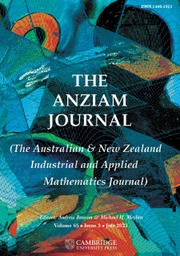Crossref Citations
This article has been cited by the following publications. This list is generated based on data provided by Crossref.
Lou, H. W.
2005.
Existence of Optimal Controls in the Absence of Cesari-Type Conditions forSemilinear Elliptic and Parabolic Systems.
Journal of Optimization Theory and Applications,
Vol. 125,
Issue. 2,
p.
367.
Lou, Hongwei
2007.
Existence and Nonexistence Results of an Optimal Control Problem by Using Relaxed Control.
SIAM Journal on Control and Optimization,
Vol. 46,
Issue. 6,
p.
1923.
Lou Hongwei
2008.
Existence of optimal control by using maximum principle.
p.
614.
Lou, Hongwei
2008.
On singular sets of local solutions to p-Laplace equations.
Chinese Annals of Mathematics, Series B,
Vol. 29,
Issue. 5,
p.
521.
Lou, Hongwei
2009.
Analysis of the Optimal Relaxed Control to an Optimal Control Problem.
Applied Mathematics and Optimization,
Vol. 59,
Issue. 1,
p.
75.
Luan, Shu
2013.
Nonexistence and Existence of an Optimal Control Problem Governed by a Class of Semilinear Elliptic Equations.
Journal of Optimization Theory and Applications,
Vol. 158,
Issue. 1,
p.
1.
Coletsos, J.
and
Kokkinis, B.
2014.
Large-Scale Scientific Computing.
Vol. 8353,
Issue. ,
p.
81.
2017.
Optimization and Differentiation.
p.
473.
Lou, Hongwei
and
Wang, Weihan
2019.
Turnpike properties of optimal relaxed control problems.
ESAIM: Control, Optimisation and Calculus of Variations,
Vol. 25,
Issue. ,
p.
74.
Lou, Hongwei
and
Zhao, Ying
2023.
Existence of the optimal controls for a controlled elliptic system with an $ L^0 $ term in the cost functional.
Mathematical Control and Related Fields,
Vol. 0,
Issue. 0,
p.
0.




